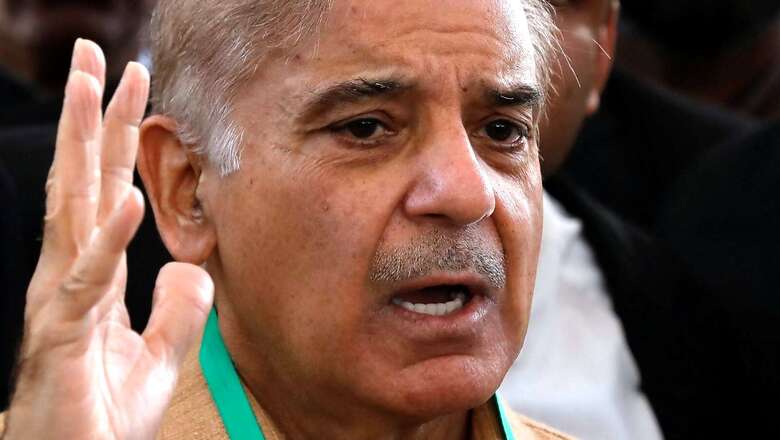
views
If a week is a long time in politics, try two weeks in Pakistan — it is an eternity. Just two weeks ago, the Pakistan Muslim League Nawaz (PMLN) seemed all set to run Pakistan until next August. Two weeks later, the PMLN was routed in a crucial by-election, suffered an extremely prejudiced and damaging verdict by Pakistan’s Supreme Court, and lost its government in the critical Punjab province to its political nemesis — Imran Khan’s Pakistan Tehreek-e-Insaf (PTI). The survival of the PMLN-led 12 party coalition government in Islamabad now looks very doubtful. Political uncertainty, instability and toxicity fuelled in part by the electoral and judicial verdicts have all but pushed the country over the edge.
The Pakistan media will of course have everyone believe that it is just another political crisis in a country accustomed to and experienced in dealing with such crises. But the political spectacle (more appropriately, a veritable political reality horror show) playing out on TV is a distraction from the fact that Pakistan is fast becoming an ungovernable country in the throes of an existential crisis to which no one really has any answers. The US and its Western allies and Pakistan’s Arab and Chinese friends are inclined to throw money at the problem. But this will only delay, not defuse the existential politico-economic crisis, which will erupt with greater intensity in the not too distant a future.
The current political instability comes at a time when the economy is on the verge of a meltdown — just in July, the rupee has weakened by almost Rs 40-45 to a dollar and has touched 250 in the open market; foreign exchange reserves have fallen to just over $8 billion; the base interest rate is already 15 percent; inflation in prices of daily necessities is around 35 percent year-on-year; unemployment is rising; large parts of the country including the financial capital Karachi have been ravaged by floods.
Meanwhile, the Pakistan Army is negotiating a surrender deal (no other way of describing it) with the Tehrik-e-Taliban Pakistan (TTP) which is seeking to establish its own proto-Emirate in the erstwhile Tribal Areas. In short, everything that could go wrong, is going wrong. The drift in the affairs of state is only worsening the existing problems and making them more intractable. And for now, it seems that things will only get worse.
For the PMLN, there are only bad options going forward. It is having to clean up the economic mess left behind by Imran Khan. But the irony is that the political benefit of trying to prevent a sovereign default is being reaped by Imran Khan, while all the political costs are being borne by the PMLN. Having lost Punjab to Imran Khan, the PMLN’s writ runs only in Islamabad. Sindh is run by PPP which despite being a coalition partner in the federal government, will brook no interference from the Centre. Balochistan really doesn’t matter in the power play in Pakistan. Khyber Pakhtunkhwa and Punjab are under Imran Khan’s control who will use the governments in these two provinces to run circles around the PMLN government in Islamabad and push for an early general election which he hopes to sweep. Not only will PTI governments in these two provinces obstruct every measure of the federal government, it will consolidate its political control by undercutting the PMLN and wheeling out freebies and social welfare schemes like the health cards etc. Meanwhile, all the really difficult economic decisions will have to be taken by the PMLN-led federal government. In other words, the entire blame for the economic pain inflicted on the people will be heaped on PMLN.
The PMLN could decide to cling to power on a wing and pray that its political fortunes will change if elections are held on schedule next year in October or November. In fact, after the by-election rout, the coalition declared that it will serve out the term of the current National Assembly. But there is little chance of the economy reviving in the next twelve months to a point where the PMLN can provide meaningful relief to the people and change the narrative in its favour before going to the hustings. Quite to the contrary, if it remains in government, the political cost of trying to manage the failing economy will only mount. The longer the PMLN stays in government, the deeper the hole it digs for itself.
But quitting the government and going in for fresh elections is also not an option, certainly not at a time when the political wind seems to be favouring Imran Khan. The dice will get further loaded against PMLN if there are no simultaneous elections to the national and provincial assemblies. Constitutionally, there is no bar on holding elections separately. With governments in KP and Punjab, Imran Khan would be foolish to give up this advantage by dissolving these two assemblies for simultaneous elections. Even the PPP would be loath to give up its government in Sindh a year earlier.
Another disadvantage for the PMLN is that it is no longer seen as the front-runner in the next elections. This means that many of the local influential or ‘electables’ will hedge their political bets. Add to all this the fact that the PMLN is not going to secure the support of the top brass of the military establishment which has avowed neutrality between the political contenders. But while the top brass will play neutral, there is a large section in the military which is rooting for Imran Khan and which is likely to use its influence to tilt things in PTI’s favour.
Clearly, the prospects for PMLN don’t appear to be very bright. The party is being led by an uncharismatic Shahbaz Sharif who can’t decide if he wants to take on Imran Khan, the military and the judiciary or wants to kowtow to them. The PMLN might have popular support but it just doesn’t have the sort of street power and the cyber nuisance that Imran Khan has demonstrated and managed to scare the military and browbeat the judges. The fighting words coming from the PMLN are all very well but unless these are translated into action they will remain empty boasts, hot air and bluster.
Take for example the decision to make changes in law on how the courts will function. On paper it sounds like taking on the judiciary that has run amok. But does PMLN have the guts and gumption to follow through? Has it thought through the second and third order effects of this step? What will it do if the President blocks the law for around a month? What if the judiciary strikes it down as ultra vires, something it is almost certain to do?
If the PMLN really wants to rattle the cage, it can play the game of brinkmanship and exercise what can be called the nuclear option – scorched earth politics in which it retracts all price hikes and cuts fuel, gas and power tariffs, and announces new subsidies. After this Shahbaz can quit, but without dissolving the National Assembly.
This is of course a risky strategy that could precipitate the impending economic meltdown because it will almost certainly kill the IMF programme.
But the choice before the PMLN is a simple one: it can either become a sacrificial lamb or remain in the political game by letting the military establishment and judiciary take the call and the fall of what happens next. The PMLN will get flak but will at least be left with a fighting chance to make a political comeback. The only problem is that Shahbaz Sharif just doesn’t have what it takes to go for broke. But if he doesn’t, then PMLN is history because the party is now looking palpably old, lacking the energy and fire that politics demands, having no fresh faces or ideas, unable to connect with a new generation because its style of politics as also its idiom is from another era. It will go the way of PPP which still mouths slogans and flaunts icons from 50 years back which have no resonance with the bulk of voters.
But it is not just the PMLN whose future is at stake. The military establishment too has a crisis on its hands. There are signs that the military establishment is itself divided. The Army Chief Qamar Bajwa has lost his primacy and is seen as being on his way out. Bets are already being placed on his successor. Imran Khan’s favourite, the former ISI chief Faiz Hameed who is currently commanding the Peshawar Corps could well become the next chief if
elections are held in October or early November. That appointment will certainly prove divisive in the Army.
Not surprisingly, most of the top brass are not comfortable with the idea of Imran Khan returning to power even more powerful than before and therefore less amenable to control or reason. They fear that he will damage Pakistan, divide it, isolate it, bankrupt it. There is both a personal and institutional angle at play — the top generals have a legitimate expectation of becoming army chief which won’t happen if Imran Khan wins the election; Institutionally, there is concern in the army that Imran Khan will play politics in the army, apart from neutering it.
If Shahbaz quits and early elections are called, a caretaker government will have to be set up. The buzz in Islamabad is of a technocrat government which will be installed as a caretaker but which could have its term extended for a few years to put the economy on the rails — the Bangladesh model. But once again, has this option been thought through? Will the judiciary legitimise this government? What will the politicians, including Imran Khan, do? Will they simply lump it or will they take to the streets. If the former, then there could be a three to five-year hiatus before the next election, during which time some major constitutional changes — undoing 18th Amendment, devolving power to local bodies, perhaps introducing a presidential system, making sweeping electoral reforms etc. could be made. But if the politicians take to the streets then all bets are off.
The problem for the Army is that until now it has managed to exercise control and influence with minimum violence. It has ruled through fear mostly. But that fear factor is seriously reduced and to restore it the army will have to resort to brute violence against the people, especially in Punjab. Is the Army ready to do that? This is highly unlikely under the present dispensation led by Bajwa. But even if he was replaced, the army won’t be able to resort to large-scale violence to re-establish its control.
If this option is not feasible then the only option is to go for quick elections. The earliest this can happen is around three months. This time period is critical because the economy is weeks, if not days away from a meltdown. Assuming the caretaker is able to hold things together till the elections are held, there is the question of what will the results throw up? The best case scenario is a hung assembly in which a government resembling the current coalition is formed. But if Imran is denied power will he accept it or will he create mayhem on the streets?
Equally unpalatable is the prospect of Imran winning. He has already burnt bridges with everyone: The Americans are wary of him, the Europeans are not exactly rooting for him, the Arab states will probably hold back whatever money they are ready to sink in Pakistan, even the Chinese are cut up with Imran for creating problems in CPEC. The economy aside, Imran and his megalomania will prove ruinous for Pakistan. Perhaps this is as good a reason as any for India to do everything possible to see Imran getting back in power.
Sushant Sareen is a Senior Fellow at the Observer Research Foundation. The views expressed in this article are those of the author and do not represent the stand of this publication.
Read all the Latest News and Breaking News here













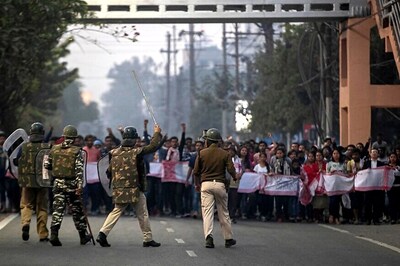
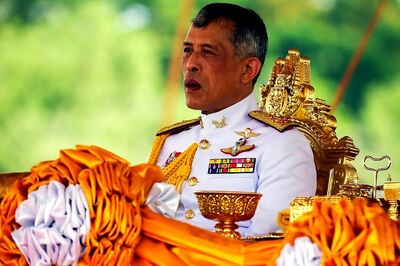
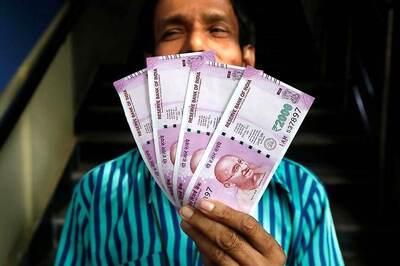

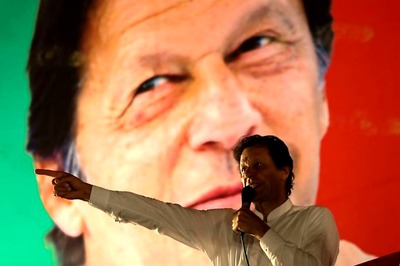


Comments
0 comment